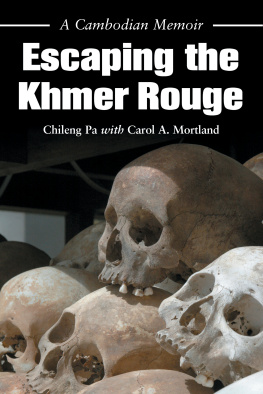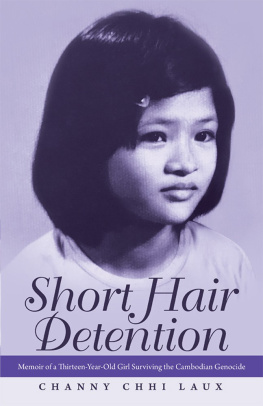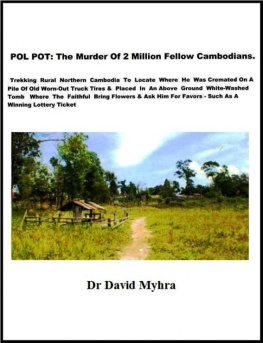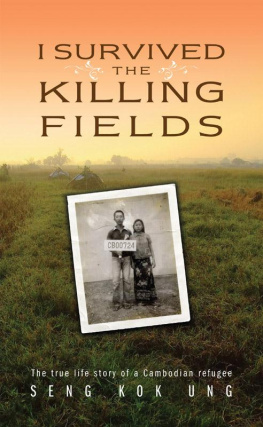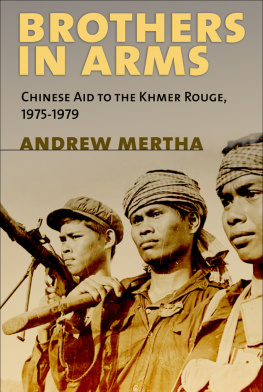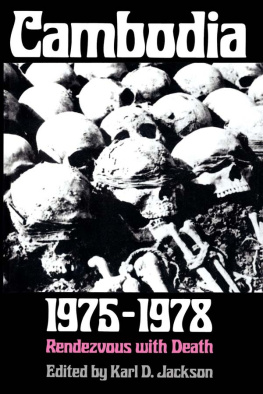Escaping the Khmer Rouge
A Cambodian Memoir
CHILENG PA
with CAROL MORTLAND

McFarland & Company, Inc., Publishers
Jefferson, North Carolina
Publishers note: This book was written over the years 1999 to 2005 in close collaboration between Chileng Pa and Carol Mortland. Chileng Pa died in April 2005 as the manuscript was being completed.
LIBRARY OF CONGRESS CATALOGUING DATA ARE AVAILABLE
BRITISH LIBRARY CATALOGUING DATA ARE AVAILABLE
e-ISBN: 978-1-4766-2828-8
2008 Carol A. Mortland. All rights reserved
No part of this book may be reproduced or transmitted in any form or by any means, electronic or mechanical, including photocopying or recording, or by any information storage and retrieval system, without permission in writing from the publisher.
Cover photograph 2007 Shutterstock
McFarland & Company, Inc., Publishers
Box 611, Jefferson, North Carolina 28640
www.mcfarlandpub.com
Dedication by Chileng Pa
(2004)
This book is a simple strand of remembrance, a document from memory created for the young generations of Cambodians and others in this world. I write it to raise the awareness of a dark period in Cambodian history, when the dictatorial, strong arm of the Khmer Rouge ruled the country for three years, eight months, and twenty days. The rule brought nothing but tragedy to my fellow countrymen.
I write this to honor the memory and spirit of all the innocent Cambodians who sacrificed their lives defending their nationality and the right to practice their religion. Among them are my wife Devi, my son Sokhanarith, and nine members of my wifes family, my beloved grandmother Sophal Prong, my stepmother Neary, and more than two million other kind-hearted, peace-loving souls.
I dedicate this book to their spirits.
I dedicate this book also to my wife, Chan, my daughter Sokhary, and my son Sokchea, who allowed me to care for them, feed them, caress and love them in the life I was grateful to have after the horrors of Cambodia. I am grateful for the support and love they and the rest of my family gave to me and accepted from me in the United States. Thank you.
Acknowledgments
This book is my first experience at writing a book. I was filled with anxiety and fear when I started the actual writing. I would like to express my deep gratitude to Dr. Carol A. Mortland, who is my wonderful sponsor. She read my drafts and made corrections to them, and encouraged me when I felt depressed by my memories.
I also want to express my appreciation to the friends who have helped with this writing while I was in prison. We were in a difficult situation, but they put aside their own concerns to assist me in finding the English words I needed to tell my story.
Then, I would say thank you in advance to you, the reader, for your interest in finding out what happened in the country of Cambodia when it was governed by the Khmer Rouge regime, and what happened to me in my lifetime. Thank you for taking your time to read my true story.
Most importantly, I must thank my wife, Chan, my daughter, my son, my brothers, sisters-in-law, and brothers-in-law for your constant love and support, no matter the circumstances of our lives. I thank my beloved friend and abbot of my temple, extended family, and friends and colleagues, both in Cambodia and America. You gave me life again after the Pol Pot years. You listened to me, argued with me, cared for me, loved me. I will never forget you.
Chileng Pa, 2004
My gratitude goes first to Chileng Pa for telling his story to me and allowing me to finish it for him, and to his family, for permitting its publication. I thank Chilengs family: Chan, the woman Chileng loved first and last; his daughter, Sokhary, and son, Sokchea; the brothers of his youth with whom he was joyously reunited in the refugee camp and who have remained his responsibility until they had to take responsibility for him after his illness, Meng, Mhang, and Leang; his wifes sisters, Chandy and Chanthol, who continue to rule us all; his foster children; his brothers-in-law; and his brothers wives.
I want to also thank Chilengs American prison comrades and teachers who helped him write his story. These amazing people assisted him in writing and rewriting his story. I wish I knew your names. Thank you, for listening to him and honoring his story with your interest, advice, and knowledge.
My thanks to those who assisted in this books creation. I thank the Cambodians who taught me about their history, culture, and lives and thus incurred my commitment to Cambodias stories. I thank my biological family for their strength and interest, my sister, Annette Gililland, and brother, Tom Mortland, who attended Chilengs funeral ceremonies; and students, colleagues, friends, and family who reviewed the manuscript and made suggestions, including Drs. Linda Kosa-Postl and Caroline Hartse. Im grateful to Dr. Chris Byrne for creating the map.
As always, I thank my colleague, Dr. Judy Ledgerwood, for her knowledge, assistance, and friendship, and her husband, Un Kheang, for the same. Personally, without my family, how could I do anything?
Carol Mortland
Preface
by Carol Mortland
Chileng is not the real name of the man whose story follows, at least not the name by which he was known in America. In deference to the wishes of his wife and daughter and the privacy of his family, I have used pseudonyms to relay the story of my Cambodian brother to you. With the exception of myself and several historic and academic figures, Ive used pseudonyms for those who have been part of his life.
Using pseudonyms is curiously appropriate in writing about Chileng, for name changes have tracked his life. When he was born, he was given his family name, Pa, and was called Chileng after a type of gecko. Later, he was nicknamed Leng by his schoolmates.
Living in the hell created by the Cambodian communists, he changed his name to Thy to conceal his identity as a soldier for the previous government. When he fled to Vietnam, he changed his name to Lam to prevent the Khmer Rouge from discovering his whereabouts and demanding his return.
In the refugee camps, he learned of a potential sponsor living in the United States named Duong Sang. Hoping this man would become his sponsor and thinking his name was Song rather than Sang, Chileng changed his name to Samol Song so they would appear to be relatives. Duong Sang did, indeed, become his sponsor, so Chilengs name in America became Samol Sang.
Many years later, he became number 27490-086, to the astonishment of his family and community, not to mention his American friends and colleagues. In the end, Chileng wanted his book to be written under his birth name, Chileng Pa or, in the Cambodian manner, Pa Chileng, thus bringing his life full circleat least symbolically.
While pseudonyms are appropriate for writing about Chileng, I regret their use.
Pseudonyms shield the true honor I believe this story sheds on Chileng and his families: those lost in Cambodia and those alive in America. They reflect the ordinary and the extraordinary of human life, in both ordinary and extraordinary times. They were weak and strong, fragile and brash, thin and fat, poor and rich. Always, they loved one another and life, not in a sentimental manner but in a complex, enthusiastic, and vibrant way.
I want to add another word about names and naming. When I was with Chileng, I was struck by Cambodians ubiquitous use of kinship terms. Not only in Chilengs childhood community of Chinese Cambodians, many of whom were extended family, but in all of Cambodia, it is usual for people to address one another by kin terms. People the age of ones grandparents are called by grandparent terms; people the age of ones parents are called aunts and uncles; and those of ones own generation by sibling terms. Thus, Chileng referred to many of his friends as brother or sister.

